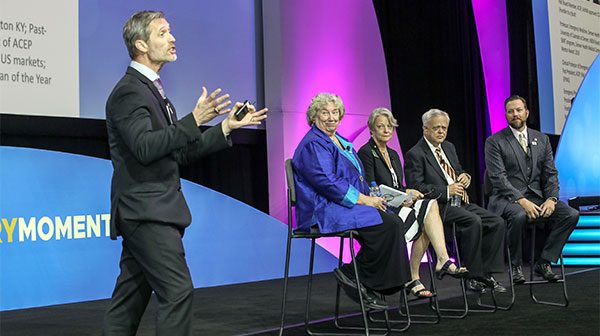
SAN DIEGO—It was Feb. 20, 1980, and Pamela Bensen, MD, MS, FACEP, was sitting for a nascent specialty’s inaugural board exam. It took about seven minutes of reading science questions so basic as to be irrelevant to daily practice before the room finally erupted in the most laughter the former ACEP member has still ever heard. Fast forward to ACEP’s 1995–1996 year, when then-new President Gregory Henry, MD, FACEP, was lobbying—meaning fighting—to make sure his members got paid for reading X-ray films. The friction from that battle later gave way, as Dr. Henry’s daughter married the son of a prominent radiologist with whom he butted heads.
Explore This Issue
ACEP18 Wednesday Daily NewsHumor, struggle, love—emergency medicine has seen it all. And in Tuesday’s James D. Mills Jr. Memorial Lecture, “ACEP@50: Past, Present, and Future,” it was proudly put on display.
“We’re at risk, as we move into the future, of forgetting our past,” said Kevin Klauer, DO, EJD, FACEP, ACEP Now Medical Editor-in-Chief and the Mills Lecture moderator. “It’s events like this that codify… what has happened and what we’ve done to celebrate.”
The past five decades have clearly borne a present hungry for more. A field ready to be more inclusive of women and diversity, Dr. Bensen said. A specialty that needs to be involved not just in health care decisions, but health care policy, said Ryan Stanton, MD, FACEP, of Central Emergency Physicians in Lexington, Kentucky.
“We need to drive some of the decisions in the house of medicine,” Dr. Stanton added. “And those decisions mean…we have to be active in fighting for everything that is emergency medicine.”
That way, today’s fights are tomorrow’s progress.
Veteran professor and ABEM Board of Directors member Kerry Broderick, MD, FACEP, said that includes an education system where virtual reality and bespoke learning programs teach students in ways that reach them best.
“We don’t all need to spend the time learning things that maybe we don’t need to learn,” Dr. Broderick said. “We believe learning platforms…will be tailored to the knowledge gaps that the person needs to learn.”
Perhaps the future’s biggest question is burnout, especially in a field where it seems to many there’s not much of a career path after decades of shift work.
“If you’re 62 years of age and still fighting drunks in the emergency department at 2 in the morning, that’s a bitch.,” Dr. Henry said. “We have to legitimize the maturing of the career… it is no shame on anyone to say, ‘You know, I had my time doing that. And now I’m going to do this.’”
Pages: 1 2 | Single Page




No Responses to “Laughs and Struggles of EM Highlighted in Mills Lecture”